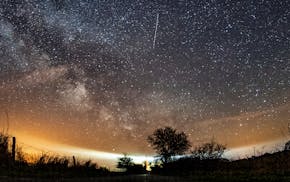Scientists have long blamed a single culprit in the sudden mass extinction that took out the dinosaurs: an asteroid that came screaming out of the skies some 66 million years ago. But it turns out that this asteroid may have had an accomplice.
Scientists studying ancient lava flows in the Deccan Traps in India have also implicated the massive volcanic eruptions started right around the same time that the asteroid hit — eruptions that, together with the impact, would have filled the air and covered the Earth with toxic fumes and dust, driving countless species to extinction. The findings, in the journal Science, bind together two long-held theories about what killed off the dinosaurs (and many other species).
The amount of lava extruded is "enough to cover the entire Earth to a depth of something like a meter or so. It's really big," said lead author Paul Renne, a geochronologist at the Berkeley Geochronology Center.
After dating the rock samples, they were able to show that the change in volcanic eruption — from frequent but small to occasional but enormous — occurred within roughly 50,000 years of the asteroid's arrival, which bolsters the case that the two were related.
Wildlife thriving in Chernobyl zone
A new study of wildlife in the radiation-contaminated Chernobyl exclusion zone has found that many large mammal populations — elk, roe deer, red deer, wild boar and wolves — seem to be thriving.
The findings in the journal Current Biology hint that when it comes to threats to wildlife, a nuclear disaster may be less harmful than human encroachment. "These results demonstrate for the first time that, regardless of potential radiation effects on individual animals, the Chernobyl exclusion zone supports an abundant mammal community after nearly three decades of chronic radiation," the study authors wrote.
How is this possible ? It seems that any harm from the radioactive fallout is far outweighed by the benefit of not having humans around.
Before the accident, they said, mammal population densities were probably reduced because of hunting, forestry and agriculture — human encroachment on their habitats, in other words.
News services

Why you should donate clothing: It (probably) won't end up at the dump

Apple pulls WhatsApp and Threads from App Store on Beijing's orders

The Lyrid meteor shower peaks this weekend, but it may be hard to see it

Legislation that could force a TikTok ban revived as part of House foreign aid package
![Cattle at the Wysocki Dairy CAFO (concentrated animal feeding operation) in Armenia, Wisc. in late October. ] Aaron Lavinsky • aaron.lavinsky@s](https://arc.stimg.co/startribunemedia/GNUPD5JDUEDREIFU5RKJM2EV2Y.jpg?h=91&w=145&fit=crop&bg=999&crop=faces)